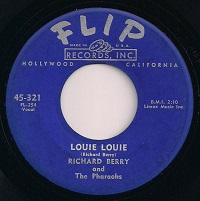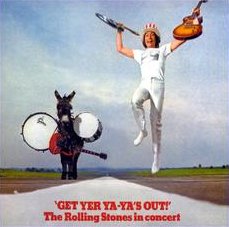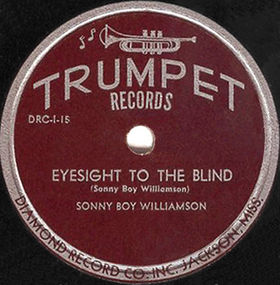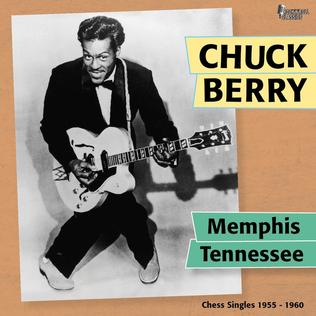Related Research Articles

Charles Edward Anderson Berry was an American singer, songwriter and guitarist, and one of the pioneers of rock and roll music. Nicknamed the "Father of Rock and Roll", he refined and developed rhythm and blues into the major elements that made rock and roll distinctive with songs such as "Maybellene" (1955), "Roll Over Beethoven" (1956), "Rock and Roll Music" (1957) and "Johnny B. Goode" (1958). Writing lyrics that focused on teen life and consumerism, and developing a music style that included guitar solos and showmanship, Berry was a major influence on subsequent rock music.

"Louie Louie" is a rhythm and blues song written and composed by American musician Richard Berry in 1955. It is best known for the 1963 hit version by the Kingsmen and has become a standard in pop and rock. The song is based on the tune "El Loco Cha Cha" popularized by bandleader René Touzet and is an example of Afro-Cuban influence on American popular music.

"Johnny B. Goode" is a 1958 rock-and-roll song written and first recorded by Chuck Berry. The song was a major hit, peaking at number two on Billboard magazine's Hot R&B Sides chart and number eight on its Hot 100 chart.

Five Live Yardbirds is the live debut album by English rock band the Yardbirds. It features the group's interpretations of ten American blues and rhythm and blues songs, including their most popular live number, Howlin' Wolf's "Smokestack Lightning". The album contains some of the earliest recordings with guitarist Eric Clapton.

"Rock and Roll Music" is a song written and recorded by Chuck Berry. It has been widely covered and is one of Berry's most popular and enduring compositions.

"Back in the U.S.A." is a song written by Chuck Berry that was released in 1959 and was a top 40 hit. A cover version in 1978 by Linda Ronstadt was also a hit.

"Roll Over Beethoven" is a 1956 hit single written by Chuck Berry, originally released on Chess Records, with "Drifting Heart" as the B-side. The lyrics of the song mention rock and roll and the desire for rhythm and blues to replace classical music. The title of the song is an imperative directed at the composer Ludwig van Beethoven to roll over out of the way and make room for the rock and roll music that Berry was promoting. The song has been covered by many other artists, including the Beatles and the Electric Light Orchestra. Rolling Stone magazine ranked it number 97 on its list of the "500 Greatest Songs of All Time".

'Get Yer Ya-Ya's Out!': The Rolling Stones in Concert is the second live album by the Rolling Stones, released on 4 September 1970 on Decca Records in the UK and on London Records in the US. It was recorded in New York City, New York and Baltimore, Maryland in November 1969, just before the release of Let It Bleed. It is the first live album to reach number 1 in the UK. It was reported to have been issued in response to the well known bootleg Live'r Than You'll Ever Be.

The London Chuck Berry Sessions is an album of studio recordings and live recordings by Chuck Berry, released by Chess Records in October 1972 as LP record, 8 track cartridge and audio cassette. Side one of the album consists of studio recordings, engineered by Geoff Calver; side two features three live performances recorded by the Pye Mobile Unit, engineered by Alan Perkins, on February 3, 1972, at the Lanchester Arts Festival in Coventry, England. At the end of the live section, the recording includes the sounds of festival management trying in vain to get the audience to leave so that the next performers, Pink Floyd, can take the stage; the crowd begins chanting "We want Chuck!". His backing band were Onnie McIntyre (guitar), Robbie McIntosh (drums), Nic Potter (bass) and Dave Kaffinetti (piano). Both McIntosh and McIntyre would later form The Average White Band.

St. Louis to Liverpool is the seventh studio album and tenth album overall by rock and roll artist Chuck Berry, released in 1964 on Chess Records, catalogue number 1488. It peaked at number 124 on the Billboard album chart, the first of Berry's studio albums to appear on the chart. Music critic Dave Marsh named it "one of the greatest rock & roll records ever made".

"Eyesight to the Blind" is a 12-bar blues song written and recorded in 1951 by Sonny Boy Williamson II. He also recorded the related songs "Born Blind", "Unseeing Eye", "Don't Lose Your Eye", and "Unseen Eye" during his career. The Larks, an American rhythm and blues group, recorded the song, which reached number five on the R&B charts in 1951. Several musicians subsequently recorded it in a variety of styles. The Who used Williamson's lyrics for their adaptation for the rock opera Tommy.

"The Thrill Is Gone" is a slow minor-key blues song written by West Coast blues musician Roy Hawkins and Rick Darnell in 1951. Hawkins' recording of the song reached number six in the Billboard R&B chart in 1951. In 1970, "The Thrill Is Gone" became a major hit for B.B. King. His rendition helped make the song a blues standard.
"Honky Tonk" is a rhythm and blues instrumental written by Billy Butler, Bill Doggett, Clifford Scott, and Shep Shepherd. Doggett recorded it as a two-part single in 1956. It peaked at number two for three weeks on the Billboard Hot 100, and was the biggest R&B hit of the year, spending thirteen non-consecutive weeks at the top of the charts. "Honky Tonk" became Doggett's signature piece and an R&B standard recorded by many other performers. This instrumental is noted for the Bass Guitar solo and the electric guitar solos in Part 1, while the tenor saxophone solo, which is first heard in Part 1, becomes dominant in Part 2. The handclaps are throughout the instrumental. Doggett's yells are heard a half dozen times. Doggett's electric organ is only heard in the final cadenza, in Part 2, right before the drummer concludes with the Cymbal crash.
"Sweet Little Sixteen" is a rock and roll song written and first recorded by Chuck Berry, who released it as a single in January 1958. His performance of it at that year's Newport Jazz Festival was included in the documentary film Jazz on a Summer's Day. It reached number two on the Billboard Hot 100, one of two of Berry's second-highest positions—along with Johnny Rivers cover of "Memphis, Tennessee"—on that chart. "Sweet Little Sixteen" also reached number one on the R&B Best Sellers chart. In the UK, it reached number 16 on the UK Official Charts. Rolling Stone magazine ranked the song number 272 on its list of the "500 Greatest Songs of All Time" in 2004. He used the same melody on an earlier song, "The Little Girl From Central" recorded on Checkmate in 1955.

"Memphis, Tennessee", sometimes shortened to "Memphis", is a song by Chuck Berry, first released in 1959. In the UK, the song charted at number 6 in 1963; at the same time Decca Records issued a cover version in the UK by Dave Berry and the Cruisers, which also became a UK Top 20 hit single. Johnny Rivers's version of the song was a number two US hit in 1964.
"Let It Rock" is a song written and recorded by rock and roll pioneer Chuck Berry. Chess Records released it as single, which reached number 64 on the U.S. Billboard Hot 100 chart in February 1960. Chess later added it to Berry's album Rockin' at the Hops (1960). In 1963, Pye Records released it as a single in the UK, where it reached number six.

"You've Made Me So Very Happy" is a song written by Brenda Holloway, Patrice Holloway, Frank Wilson and Berry Gordy, and was released first as a single in 1967 by Brenda Holloway on the Tamla label. The song was later a huge hit for jazz-rock band Blood, Sweat & Tears in 1969, and became a Gold record.

Live'r Than You'll Ever Be is a bootleg recording of the Rolling Stones' concert in Oakland, California, from 9 November 1969. It was one of the first live rock music bootlegs and was made notorious as a document of their 1969 tour of the United States. The popularity of the bootleg forced the Stones' label Decca Records to release the live album Get Yer Ya-Ya's Out! The Rolling Stones in Concert in 1970. Live'r is also one of the earliest commercial bootleg recordings in rock history, released in December 1969, just two months after the Beatles' Kum Back and five months after Bob Dylan's Great White Wonder. Like the two earlier records, Live'r's outer sleeve is plain white, with its name stamped on in ink.
"Wee Wee Hours" is a song written and recorded by Chuck Berry in 1955. Originally released as the B-side of his first single, "Maybellene", it went on to become a hit, reaching number 10 in the Billboard R&B chart.

"Little Queenie" is a song written and recorded by Chuck Berry. Released in March 1959 as a double A-side single with "Almost Grown", it was included on Chuck Berry Is on Top (1959), Berry's first compilation album. He performed the song in the movies Go, Johnny Go! (1959) and Hail! Hail! Rock 'n' Roll (1987). It has been covered by many artists, including the Beatles, the Rolling Stones and REO Speedwagon. One year earlier, Berry had released "Run Rudolph Run", a Christmas song with the same melody.
References
- ↑ "The Chuck Berry Database: Details For Recording Session: 12. 6. 1958". A Collector's Guide to the Music of Chuck Berry. Dietmar Rudolph. Retrieved 28 September 2021.
- ↑ Whitburn, Joel (1988). Top R&B Singles 1942–1988 . Menomonee Falls, Wisconsin: Record Research. p. 42. ISBN 0-89820-068-7.
- 1 2 Greenwald, Matthew. "Chuck Berry: Carol – Review". AllMusic . Retrieved May 12, 2018.
- ↑ "Carol – Also Performed By". AllMusic . Retrieved May 12, 2018.